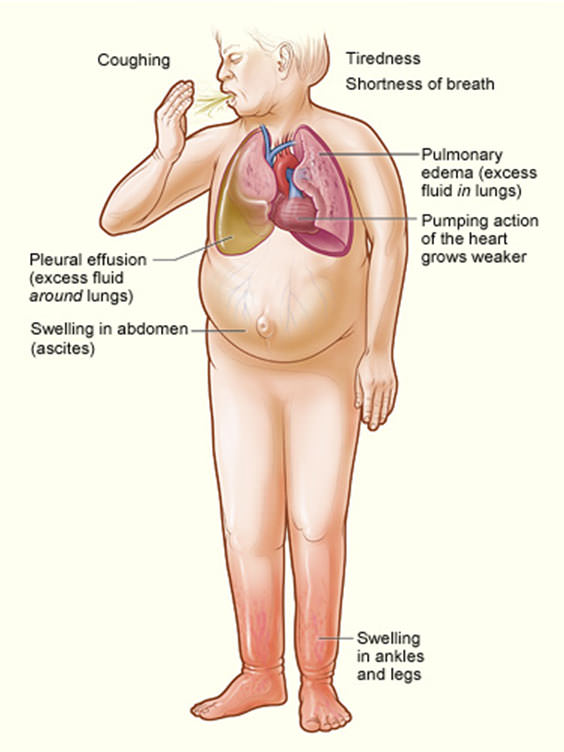Take it easy… stay in bed. That’s what most doctors tell patients with congestive heart failure. I can’t think of worse advice.

What’s Congestive Heart Failure?
Congestive heart failure (CHF) means your heart can’t pump enough blood for your body’s needs. Blood builds up behind the heart. Fluids accumulate in the lungs and make you weak, tired and short of breath. Less blood flowing to your brain makes you dizzy and confused. Vital organs like your lungs, brain and kidneys begin to shut down.
What Happens When You Have CHF?
A heart with CHF is severely deconditioned. When your heart pumps less blood than it receives, fluid backs up. Your heart swells like a water balloon.

How Can Congestive Heart Failure Be Treated?
Like any muscle, the heart needs exercise to build strength — not rest. I help my heart patients build up their heart muscle with my PACE program. It’s the best way to improve your heart’s capacity and increase its pumping power. And it only takes 12 minutes a day. You can get specific workouts, resources and information about exercising with PACE by clicking here.
Mainstream Treatments for CHF
Bed rest isn’t the only bad advice cardiologists give CHF patients. They also prescribe Big Pharma drugs that make CHF worse.
- ACE inhibitors and diuretics cause constant fatigue, weakness and shortness of breath;
- Beta-blockers decrease cardiac output by blocking hormones that allow the heart to beat faster and harder; and
- Statins deplete the heart’s cellular energy and steal its power to pump.
These drugs don’t build heart strength. They contribute to an earlier death.
Better Ways to Treat Congestive Heart Failure
Instead of drugs, I recommend a cocktail of four nutrients to provide more energy to your heart. You’ll never hear about this from your cardiologist. But I have successfully
treated many patients with this powerful nutrition therapy.Here’s the nutritional cocktail I use to reverse congestive heart failure in my patients.
1. Fuel for your heart.
In my experience, there is no better treatment for congestive heart failure than CoQ10. It provides the fuel needed by your mitochondria — the tiny power plants within each of your cells.
Your heart — because of its high-energy needs — has a higher concentration of CoQ10 than anywhere else in the body. Deprive your heart of CoQ10 and its available energy plunges.
Decades of research link low CoQ10 with congestive heart failure. In fact, 50% to 75% of patients with any kind of heart disease have low CoQ10.1
But supplementing with CoQ10 can bring immediate, often lifesaving benefits. A famous Portuguese study known as Q-SYMBIO provides dramatic proof.2
Researchers enrolled 420 patients with moderate to severe congestive heart failure. Patients took either 100 mg of CoQ10 three times daily or a placebo. After two years the CoQ10 group cut their risk of death in half. They had less weakness and fatigue and half the rate of acute heart problems.
Some of the best sources of CoQ10 are beef, chicken and fish. But if you have been taking statins, your levels are likely to be very low. That’s why I recommend taking a supplement.

If you are over 30 and in good health, take 30 mg of CoQ10 daily. If you are over 60, increase your dose to 60 mg daily.
If you have heart disease, high blood pressure, chronic fatigue or are taking statins, take at least 100 mg a day. And look for the ubiquinol form of CoQ10. It’s eight times more powerful than the more common ubiquinone form.
2. A new source of energy.
As you get older, mitochondria in your heart cells become weak and die. CoQ10 does an amazing job of squeezing more power out of the mitochondria you have left. But another little-known nutrient — called pyrroloquinoline quinone, or PQQ — does even more.
PQQ neutralizes free radicals that damage and kill off your mitochondria. At the same time, it triggers your heart cells to build healthy new power generators.
You can get PQQ from food. Good sources are kiwi fruit, sweet green peppers, carrots, potatoes, cabbage, sweet potatoes and bananas.

But I find most people need a supplement to get all the heart benefits. I recommend taking 10 mg of PQQ daily with your CoQ10.
3. Power up your mitochondria.
The cellular walls of your mitochondria are really tough. They make it hard for fuel to get through to these little power plants. That’s where L-carnitine comes in.
This fatty acid lives in the inner skin of the mitochondria. It acts like a border agent, getting fuel across the cell membrane barrier.
Studies show patients with congestive heart failure have low L-carnitine. In one study, a whopping 66% of chronic CHF patients showed marked improvement in their condition after being treated with L-carnitine.3
You can get L-carnitine by eating red meat and whole dairy products. But if you have congestive heart failure, you’ll need a supplement. I recommend taking 2,000 mg daily.
4. Breathe easy.
D-ribose is a carbohydrate found in every living cell in the body. Without it, cells can’t produce energy. And it is essential to the energy levels of the muscle tissue in your heart.
Studies show D-ribose improves the heart’s ability to relax.4 With better relaxation, it has more power to pump blood to the rest of the body.
D-ribose significantly improves congestive heart failure.5 It also improves breathing capacity — a powerful predictor of death in CHF patients. In one study, 15 CHF patients took D-ribose for just eight weeks. Most of them showed real breathing benefits — more heart-muscle strength and more oxygen intake — even during exercise.6
You can’t get D-ribose from food. You have to supplement.
I advise my patients to take 5 grams of powdered D-ribose three times a day. You can mix it into an 8-ounce glass of water or juice and then drink it all down at breakfast, lunch and dinner.
To Your Good Health,
![]()
Al Sears, MD, CNS
1. A.S. Go et al., “Heart Disease and Stroke Statistics – 2013 Update: A Report from the American Heart Association.”
2. Mortensen S, Kumar A, Filipiak K, et al. “The effect of coenzyme Q10 on morbidity and mortality in chronic heart failure. Results from the Q-SYMBIO study.” European Journal of Heart Failure. 2013;15(S1):S20.
3. Mortensen SA, Rosenfeldt F, Kumar A, et al. The Effect of Coenzyme Q10 on Morbidity and Mortality in Chronic Heart Failure: Results From Q-SYMBIO: A Randomized Double-Blind Trial. JCHF. 2014;2(6):641-649.
4. Heyder, O., et al. “D-Ribose improves diastolic function and quality of life in congestive heart failure patients: a prospective feasibility study.” European Journal of Heart Failure. October 2003; 5:5; 615-619.
5. David L. Katz, MD. “The resurrection of coenzyme Q10: It’s all about the money.” Accessed 5/6/16. 6. Kobayashi A, Masumura Y, Yamazaki N. “L-carnitine treatment for congestive heart failure–experimental and clinical study.” Jpn Circ J. 1992;56(1):86-94.

